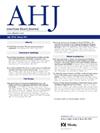Cardiac auscultation skills among medical trainees
IF 3.7
2区 医学
Q1 CARDIAC & CARDIOVASCULAR SYSTEMS
引用次数: 0
Abstract
Background
Many experts suspect there has been a gradual decline in cardiac auscultation skills among physicians, though no studies have examined this hypothesis over time. We sought to better evaluate the long-term change in medical trainees' cardiac auscultation skills.
Methods
We performed a repeated cross-sectional study to analyze medical trainee performance on a cardiac auscultation simulation test over an 11-year period. The simulation tests involved identifying pre-recorded heart sounds and murmurs. Test results were analyzed with linear regression to evaluate temporal trends in scores. Performance on individual heart sounds and murmurs was also analyzed.
Results
We included results from 411 simulation tests representing 348 medical students (84.7%), 37 residents (9.0%), and 26 cardiology fellows (6.3%). The overall average test score was 7.7 points (SD 2.5). Test scores declined over time for all trainees by 0.15 points per year (P=0.003). Fellows performed better than medical students by an average of 2.1 points (P < 0.001), while residents performed better than medical students by an average of 1.1 points (P = 0.008). Overall performance on individual heartsounds and murmurs was variable with no significant change in performance over time.
Conclusion
Medical student trainees at an academic medical center had declining cardiac auscultation skills over time, with a possible similar decline noted among internal medicine residents and cardiology fellows. This study underscores the importance of broad investment in strategies for teaching cardiac auscultation to preserve and improve this essential skill.
医学学员的心脏听诊技能。
许多专家怀疑医生的心脏听诊技能在逐渐下降,尽管还没有研究证实这一假设。为了更好地评估心脏听诊技能的长期变化,我们进行了一项重复的横断面研究,分析了11年期间医疗培训生在心脏听诊模拟测试中的表现。我们的数据表明,随着时间的推移,医学生的模拟测试成绩有所下降。这项研究强调了广泛投资于心脏听诊教学策略的重要性,以保持和提高这一宝贵的技能。
本文章由计算机程序翻译,如有差异,请以英文原文为准。
求助全文
约1分钟内获得全文
求助全文
来源期刊

American heart journal
医学-心血管系统
CiteScore
8.20
自引率
2.10%
发文量
214
审稿时长
38 days
期刊介绍:
The American Heart Journal will consider for publication suitable articles on topics pertaining to the broad discipline of cardiovascular disease. Our goal is to provide the reader primary investigation, scholarly review, and opinion concerning the practice of cardiovascular medicine. We especially encourage submission of 3 types of reports that are not frequently seen in cardiovascular journals: negative clinical studies, reports on study designs, and studies involving the organization of medical care. The Journal does not accept individual case reports or original articles involving bench laboratory or animal research.
 求助内容:
求助内容: 应助结果提醒方式:
应助结果提醒方式:


